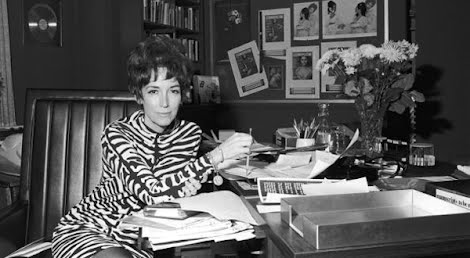Camille Paglia on 'Real Housewives' and the 'ferocity of female sexuality'

What does inspire you that’s out there now?
Bravo’s “Real Housewives” series! Whoever is doing the photography and editing for “Real Housewives of New Jersey” and also for “Real Housewives of Beverly Hills” and “Real Housewives of Orange County” — this is absolutely cutting edge. I can watch the same episode — while I’m cooking and eating dinner – five, six, or seven times. I savor how visually interesting they are — how long each shot lasts and how much information it contains. This is intelligent and sophisticated documentary filmmaking that really needs to be honored.
Documentary? Isn’t it just pop spectacle?
The early episodes of that series were bland and dull, even amateurish. Through trial and error, they eventually found a technical groove. It’s not just the sensational drama. As a soap opera fan, I’ve been in the depths of gloom for over 20 years as TV soaps declined.
...My grandmothers watched soaps, even though they barely spoke English. In the 1970s, I wrote down great lines from TV soaps. That’s when they were aimed at stay-at-home moms — all the tear-jerking emotion from the women’s pictures of the Lana Turner era. But there was this terrible decline when soaps suddenly wanted respectability — so then came the socially conscious message scripts and the crime drama. And they really missed the boat, because in the ’90s, drag queens got big!
...But the soap operas played it prim and safe. They receded and receded, and now they’re dead. The producers didn’t catch what was happening. The mass audience wanted theatricality and flamboyance! And that’s what this Bravo “Real Housewives” series is supplying in spades. I don’t like reality shows and have never watched them, but I’m addicted to “Real Housewives” because it’s authentic old-time soap opera reborn!
But beyond that, the shows are all about glamour — make up, hair, fashion. And sex! They show women trying to balance being sexy with being mothers. Most of the women on “Real Housewives of New Jersey” never went to college. So it’s great to see strong and outspoken women who are outside the elite zone of attaché-carrying careerists working their way up on Wall Street.
And these shows are archetypal bitch fests! I read a few months ago that Gloria Steinem hates “Real Housewives of New Jersey” and would be glad to picket it. Well, there’s the big difference between Steinem and me. She sees the show as a distortion of women, while I see it as a revelation of the deep truth about female sexuality. Right there is the proof of why feminism has faded. Those second-wave feminists had a utopian view of women — they constantly asserted that anything negative about women is a projection by men. That’s not what I see on “Real Houswives”! It’s like the Discovery Channel — sending a camera to the African savannah to watch the cheetahs stalking the gazelles! What you’re seeing is the primal battles going on among women. Men are marginalized on these shows — they’re eye candy, to use Obama’s phrase, on the borderlines of the ferocity of female sexuality.
...The class issues on those shows fascinate me. They’re all aggressive climbers. Some seem to be making a lot of money, others are constantly going bankrupt. They’re trying to figure out how to live as big as they possibly can.
And the McMansions!
Those crazy houses. But then you look at the other end of TV obsessions — it’s “Mad Men,” with a sort of cool Manhattan new money, or a show like “Downton Abbey,” which celebrates old-fashioned aristocracy.
I can’t watch them — they’re claustrophobic. I feel they’re dead visually as well as in terms of their scripts and content. We’re trapped in a derivative period of remakes and retro-this and retro-that. It’s all over “cool” — which is exactly what’s affecting the fine arts, too.
You’ve always said that. That a cool, jejune kind of urban sensibility ruins art.
Right! I can’t stand it. Now Andy Cohen, the executive producer of the “Real Housewives” series, is like an old-fashioned vaudevillian. The vaudeville era fed into Hollywood all those character actors who fleshed out movies for decades — like Thelma Ritter or Jack Benny. Vaudeville was live entertainment, often without microphones, where you had to go out there with a positive attitude and sell yourself. You had just a few minutes to entertain a noisy crowd and try to get rehired by the manager. As the host of “Watch What Happens Live” (which follows the “Real Housewives” episodes), Andy Cohen has that kind of exuberant energy. And it’s so amazing how openly and militantly gay he is!
The art of paring down decisions

The San Francisco scene
With a little work (or a lot, as it turned out), we could do anything, even save the world."
I say, long live the San Francisco scene.
Starting -- and hanging in

"How old are you? Twenty-one? Thirty? It doesn't matter -- you need only to have some kind of job somewhere. Then, from that most unillustrious beginning, however young or old you are, you move ever so gradually up, and, if you stay with it, the gradual moving up takes you to the top.